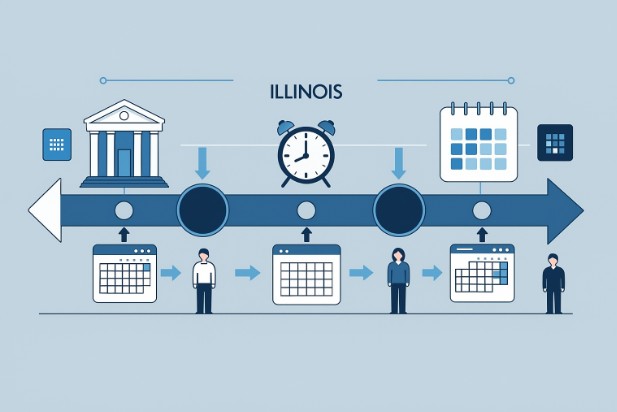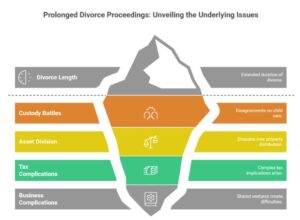The length of a divorce in Illinois depends on the level of cooperation, whether it is contested or uncontested, and the court’s schedules.
While uncontested cases may finish quickly, contested divorces can stretch from 6 months to 2 years.
The timeline largely depends on how much both parties cooperate and whether they reach agreements on matters such as property or child custody.
Illinois divorces can take anywhere from 2 months to a few years—it all hinges on the details of your situation.
Knowing what causes delays and how to respond gives you a better shot at keeping things on track.
Some delays are just part of the process, but you do have options to push forward, even if your spouse isn’t making it easy.
Key Takeaways
- Uncooperative spouses can drag out divorce proceedings, but courts have ways to limit excessive stalling.
- Contested divorces typically involve a six-month waiting period, whereas uncontested ones can proceed much more quickly.
- Working with a skilled attorney and staying organized helps reduce delays and keep your case moving forward.
Typical Divorce Timelines in Illinois

Divorce timelines in Illinois largely depend on whether you and your spouse agree on the major issues and the complexity of your situation.
Uncontested divorces can wrap up in just a few months, but if things get contested, you might be looking at six months to two years or more.
Uncontested Versus Contested Divorce Durations
Uncontested divorces typically proceed more quickly through the Illinois system. If you both agree on everything, you could be done in as little as two or three months.
When couples qualify for a simplified divorce, the paperwork is quick, and you can often skip drawn-out court hearings.
Contested divorces are a different story. A contested divorce in Illinois might last anywhere from six months to two years, depending on what you’re fighting over.
If you can’t agree on things like property, custody, or support, every dispute adds more time in court and more legal back-and-forth.
Factors Influencing Speed
Several things can speed up or slow down your divorce in Illinois. Asset complexity is a big one.
If your finances are simple, you’ll probably get through faster. If you own businesses, multiple properties, or have retirement accounts, expect the process to take longer.
Child custody issues really slow things down, especially if parents fight over schedules or decision-making. Courts often require extra hearings and evaluations.
Court schedules matter, too. Busy dockets can push hearings and final orders out by months.
Attorney cooperation can significantly impact your timeline. When lawyers work together, things just move quickly.
No Mandatory Waiting Period
Illinois doesn’t force every divorce to wait a set amount of time. There’s no waiting period for uncontested divorces if you meet the residency rule.
If you both agree on everything, you could finalize your divorce within weeks of filing. The lack of a waiting period is a significant benefit for couples who agree.
One spouse must have lived in Illinois for at least 90 days prior to filing.
The state’s no-fault approach—citing irreconcilable differences—also helps speed things along, since you don’t have to prove wrongdoing.
Six-Month Reference in Contested Cases
Contested divorces often work on a different timeline. Usually, there’s a 6-month waiting period before a judge can finalize the case.
This time allows both sides the opportunity for discovery, negotiation, and court hearings. It’s basically a window to gather evidence and try to reach an agreement.
Some sources say there’s a mandatory six-month wait unless both spouses agree to skip it—and the court signs off. But skipping that wait isn’t automatic; you both have to agree.
Six months is the minimum. A lot of contested cases drag on much longer, especially when there are complex issues or scheduling headaches.
Anna Krolikowska helps Illinois families navigate divorce efficiently, providing clear guidance on timelines and options. Even if your spouse resists, you don’t have to wait endlessly. Contact us today.
Common Delay Tactics Spouses Use

Some people deliberately slow down the divorce by using specific tactics. What could be a simple process turns into a drawn-out ordeal, and legal bills climb fast.
Non-Response or Ignoring Service
One classic move is just ignoring the divorce petition. This can tack on weeks or months.
If a spouse ignores the papers, the court can’t move forward. The person filing then has to jump through extra hoops to properly serve the documents.
Common non-response tactics:
- Ducking the process server
- Moving without leaving a new address
- Tossing out court documents
- Claiming they never got served
Illinois courts will eventually allow alternative service, like posting notices in newspapers or using certified mail. These take extra time and money, though.
If the spouse misses deadlines, it can backfire—courts might make decisions without their input.
Drawing Out Negotiations or Discovery
The discovery phase is intended to allow both sides to gather information, but some people abuse it to stall.
Discovery delay tactics:
- Handing over incomplete financial records
- Asking for endless extensions
- Scheduling depositions far out
- Claiming documents are lost or ruined
Discovery tools, such as interrogatories, document requests, and depositions, can be prolonged by slow responses.
Some spouses also make unreasonable offers simply to prolong negotiations. Others switch lawyers over and over, which resets the process each time.
Filing Repeated Motions
Another stalling tactic is filing tons of court motions. Each one takes up court time and forces both sides to respond.
Examples of excessive motions:
- Multiple requests to change temporary support
- Repeated custody evaluation asks
- Emergency motions for minor stuff
- Delaying hearings for flimsy reasons
Judges have to review every motion. Some are legitimate, but others are merely intended to prolong the process. Judges usually catch on and might start denying them, or even penalize the spouse who files them.
Valid Versus Abusive Delays
Not every delay is sneaky or abusive. Sometimes, real issues slow things down, and that’s just how it goes.
Valid reasons for delays:
- Complex asset splits that need expert input
- Serious custody disputes that need investigation
- Finding hidden assets, which can mean forensic accounting
- Genuine scheduling conflicts
Abusive delays:
- Deliberately hiding finances
- Missing court dates without a good reason
- Refusing to do the required mediation
- Making threats or using intimidation
Illinois courts can usually distinguish between them. Judges might penalize dishonest spouses or just stop believing them when they spot abusive behavior.
It mostly comes down to intent and whether both sides are genuinely working toward a solution.
Key Issues That Extend Divorce Length

Custody fights and arguments over marital assets are the most significant reasons Illinois divorces drag on. If there are businesses or tricky tax issues, expect things to slow down even more.
Custody Battles
When parents can’t agree on where the kids should live or who makes decisions, divorce cases can stretch for months.
Courts must consider a significant amount of evidence regarding each parent’s ability to care for their children.
If one parent wants to move out of state, it gets even more complicated. Illinois courts ask for a lot of paperwork showing how the move could affect the kids.
Child support gets messy when parents have irregular income. Business owners or people with commission-based jobs often have to show years of records.
If parents can’t agree on big decisions—like school, health, or religion—expect multiple court hearings.
Sometimes the court appoints a guardian ad litem to investigate what’s in the children’s best interests, and that can take months.
Asset Division
Dividing property is tough when there are multiple homes, retirement funds, or investments. Courts have to figure out what counts as marital property and what doesn’t.
If a business is involved, expert witnesses and detailed financial reviews are typically required. Appraisers need time to review everything and thoroughly determine fair values.
Spousal support depends on marriage length, income differences, and each person’s earning ability. Courts might order temporary support, but the final numbers only come after everyone has been honest about their finances.
If one spouse suspects the other is hiding assets, forensic accountants may need to review years of records.
Real estate appraisals add more time, especially if the properties are unusual or hard to value.
Tax and Business Complications
Owning a business adds a whole new layer of complexity to divorce in Illinois. If one spouse runs a company, determining its value and dividing it fairly can take months.
Tax implications make property division even trickier. Couples must consider capital gains, retirement account penalties, and other financial headaches associated with transferring assets.
Medical offices, law firms, and other professional practices need special valuation methods. Courts must separate the value tied to the owner’s reputation from the actual company assets—a not easy task.
Partnership agreements sometimes restrict the transfer of business interests in the event of a divorce. These documents can trigger buyout procedures that further lengthen the process.
Seasonal businesses? They’re a different beast. Income fluctuates throughout the year, so courts require a complete set of annual numbers to make a fair determination on support or asset division.
If your spouse is dragging out the process, Anna Krolikowska Law can file the appropriate motions, advance the timeline, and keep your case on track. Schedule an appointment now.
How to Keep a Divorce From Dragging On
If you want to keep your divorce from dragging on forever, you need to take some initiative.
Work with professionals, keep your paperwork in order, and stay open to reasonable compromise—those things really do help move things along.
Mediation and Collaborative Law for Faster Resolution
Mediation provides couples with an opportunity to resolve disputes outside of court. A neutral mediator steps in to help both sides discuss their differences, aiming for a mutually agreed-upon resolution on property, custody, and other matters.
It usually costs less than a court battle and, honestly, less time than waiting around for hearings.
Benefits of mediation include:
- Faster resolution times
- Lower legal costs
- More control over outcomes
- Private discussions instead of public court records
Collaborative law is similar, but each spouse brings their own attorney to the table. The lawyers actually work together to find solutions, steering clear of the courtroom entirely.
Of course, both options need cooperation from both sides. If one person digs in their heels, these methods can fall apart fast.
Staying Organized With Financial Records and Parenting Plans
Having your financial documents ready speeds things up. Courts require a comprehensive picture before making decisions about dividing assets or setting support payments.
Essential documents include:
- Bank statements from the past two years
- Tax returns and W-2 forms
- Pay stubs and employment records
- Investment account statements
- Mortgage and loan documents
- Credit card statements
Creating a detailed parenting plan promptly can help avoid complications. Cover things like custody schedules, holidays, and who makes decisions.
Parents who show up with a solid plan save time in negotiations. Courts appreciate it when families can work things out without endless hearings.
Importance of Flexible Negotiation and Compromise
Being willing to let go of smaller issues helps cases wrap up faster. Arguing over every little thing just burns time and racks up legal bills.
It helps to know what matters most and focus there. Maybe you trade off some household stuff to keep your retirement account—whatever makes sense for you.
Setting realistic expectations keeps disappointment (and extra negotiations) to a minimum. If you understand Illinois law on property and support, you can make smarter decisions.
Effective negotiation strategies:
- Prioritizing the most important issues
- Considering creative solutions
- Focusing on future needs rather than past grievances
- Communicating through attorneys when emotions run high
Every case is different, and how long a spouse can delay a divorce really depends on the individuals involved. Still, taking proactive steps keeps things moving.
What If Your Spouse Refuses to Cooperate?
If your spouse just won’t cooperate, Illinois courts don’t leave you stuck. The legal system gives you a few tools—court orders, default procedures, and various motions—to keep things moving when your ex is dragging their feet.
Legal Remedies
Illinois family courts have several options for handling uncooperative spouses during divorce. These options protect your rights and advance the case.
Court-Ordered Discovery allows judges to demand financial information. If your spouse hides assets or stalls on paperwork, the court can subpoena banks, employers, or anyone else who holds the records and obtain them directly.
Contempt of Court is on the table if someone ignores court orders. Judges can issue fines or even impose jail time—it’s a serious step, but sometimes it’s the only effective measure.
Attorney Fees and Sanctions can come into play if your spouse intentionally delays things. The court might order them to pay your extra legal costs.
Illinois law does not allow one spouse to completely halt a divorce by simply refusing to cooperate. Divorces can move forward with or without both signatures.
Motion Practice to Compel Action
Motion practice gives you some real leverage. These formal court requests tackle specific types of stonewalling.
A Motion to Compel asks the judge to order your spouse to answer questions or hand over documents. The court usually sets a deadline, so it puts real pressure on them.
Motion for Sanctions seeks penalties for ongoing non-cooperation. That could mean fines, attorney fees, or other consequences to encourage your spouse to take action.
Motion to Strike Pleadings takes away your spouse’s ability to argue about specific issues if they keep refusing to participate. If they don’t cooperate during discovery, they may lose their say in financial matters.
Illinois courts take these motions seriously. Having an experienced divorce attorney makes it easier to file and present these requests the right way.
When Default Divorce May Be an Option
Default divorce is an option if your spouse completely bails on the process. You can move forward without them if they just won’t respond or participate.
Requirements for Default mean you have to serve divorce papers properly and wait out the legal timeframes. If your spouse ignores all of it, you can ask the court for a default.
The Default Process means you present your side and your evidence to the judge, even if your spouse never shows up. You still have to prove your case—assets, debts, kids, all of it.
Limitations of Default are real. The court still checks everything for fairness. Default judgments have to follow Illinois law, even without input from both sides.
Default divorce works best when your spouse has basically vanished or refuses any contact. It’s a last resort, but sometimes it’s the only way forward.
Life Changes That Complicate Timelines
Major life changes that occur during a divorce can last for months, sometimes even years. New relationships, job changes, and health problems often force courts to revisit agreements and recalculate support.
Impact of Remarriage or New Partners
If a spouse starts a new relationship before the divorce is final, things get complicated. Courts must consider how this affects finances and custody.
Financial Implications:
- Spousal support calculations might need to change
- Combined household income can affect maintenance
- Asset division gets messier with new financial ties
Introducing a new partner can lead to requests for changing temporary orders. If there are kids, the court may need to evaluate the new living situation.
New relationships often stir up emotions and conflict, making negotiations harder. What could have been handled in mediation might end up in court instead.
Job or Financial Instability
Changes at work during a divorce—such as losing a job, landing a promotion, or switching careers—can prompt courts to recalculate support. These shifts affect the final settlement, like it or not.
Common Employment Issues:
- Job loss means temporary support might need to change
- Career changes can affect how the court views earning potential
- Relocation for work makes custody arrangements more complicated
- Business ownership changes require new asset valuations
Courts often verify whether job changes are genuine or merely a means to conceal income. That investigation alone can tack on months to the process.
Financial instability slows down financial disclosures. When income is all over the place, attorneys need more time to figure out what’s real and what’s temporary.
Health and Relocation Issues
Serious health problems can put divorce proceedings on pause. Courts may grant delays if an individual faces a medical emergency or requires long-term treatment.
Mental health issues sometimes call for extra time so everyone can make informed decisions. Courts want to ensure that both parties understand the terms before signing any agreements.
Relocation Complications:
- Moving to another state can create jurisdiction headaches
- Child custody laws change from state to state
- Property division rules might shift depending on the location
Military deployments can stall divorce for service members. Special rules apply, and timelines can stretch significantly longer.
Older couples sometimes face health-related delays, too. Courts want to ensure they understand the stakes, especially when retirement accounts and healthcare are at risk.
Conclusion
A spouse can drag out a divorce for months, sometimes even years, with different delay tactics. Still, Illinois courts have ways to stop unreasonable delays and push cases forward.
According to Illinois divorce timelines, a case might last anywhere from two months to several years. It all depends on how much the spouses cooperate and how complicated the case is.
Illinois law allows you to put divorce proceedings on hold for reasons such as military deployment or if the couple wishes to try again. These pauses are temporary, not forever.
Judges want to give everyone enough time to make informed decisions, but they also prevent people from abusing the process. They can set deadlines and even impose sanctions if someone continues to stall without a valid reason.
If you work with a skilled attorney, you’ll handle the process more effectively. They know how to deal with delay tactics and keep your case moving, even when things get bumpy.
Anna Krolikowska Law protects your rights and minimizes unnecessary delays, helping you transition with confidence and stability. Don’t stay stuck in limbo—Contact Us today for a confidential consultation.
Frequently Asked Questions
How long can a spouse delay a divorce in Illinois?
Contested divorces often last 6–24 months, while uncontested cases may finish in just a few months. The timeline depends on cooperation, disputes, and court scheduling.
Can a spouse refuse to divorce in Illinois?
No. A spouse may delay by refusing to sign or cooperate, but the court can still grant a divorce by default or through hearings.
What are common tactics used to stall a divorce?
Avoiding service, failing to respond, filing repeated motions, or dragging out negotiations are common stalling tactics. Courts can issue orders to prevent abuse.
Does Illinois have a mandatory waiting period for divorce?
No waiting period is required for uncontested divorces if residency rules are met. Contested cases typically take about 6 months, though the timeframe may vary.
Do custody disputes extend divorce timelines?
Yes. Custody disagreements can add months or years. Illinois aims to resolve custody issues within about 18 months of filing.
How can I speed up my divorce in Illinois?
Mediation, collaborative divorce, and staying organized with documents reduce delays. Flexibility and compromise can also significantly shorten timelines.
What if my spouse hides assets or won’t cooperate?
Courts can impose sanctions, order disclosure, or grant default judgments if one spouse obstructs the process. Legal representation helps protect your rights.


































